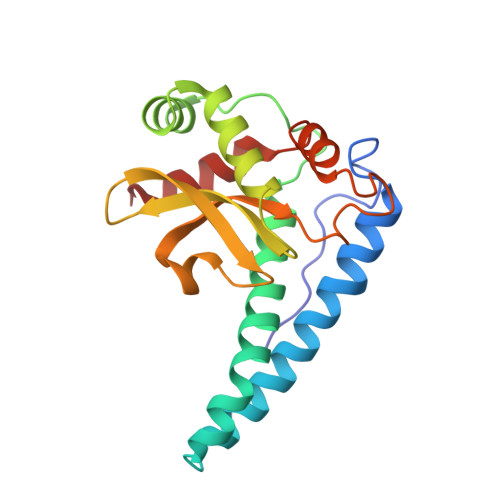Human mitochondrial manganese superoxide dismutase polymorphic variant Ile58Thr reduces activity by destabilizing the tetrameric interface.
Borgstahl, G.E., Parge, H.E., Hickey, M.J., Johnson, M.J., Boissinot, M., Hallewell, R.A., Lepock, J.R., Cabelli, D.E., Tainer, J.A.(1996) Biochemistry 35: 4287-4297
- PubMed: 8605177
- DOI: https://doi.org/10.1021/bi951892w
- Primary Citation of Related Structures:
1VAR - PubMed Abstract:
Human manganese superoxide dismutase (MnSOD) is a homotetrameric enzyme which protects mitochondria against oxygen-mediated free radical damage. Within each subunit, both the N-terminal helical hairpin and C-terminal alpha/beta domains contribute ligands to the catalytic manganese site. Two identical four-helix bundles, symmetrically assembled from the N-terminal helical hairpins, form a novel tetrameric interface that stabilizes the active sites. The 2.5 A crystallographic structure of the naturally occurring polymorphic variant Ile58Thr MnSOD reveals that the helical hairpin mutation Thr58 causes two packing defects in each of the two four-helix bundles of the tetrameric interface. Similar mutations, expected to cause packing defects in the Cu,ZnSOD dimer interface, are associated with the degenerative disease amyotrophic lateral sclerosis. Ile58Thr MnSOD is primarily dimeric in solution and is significantly less thermostable than the normal enzyme, with decreases of 15 degrees C in the main melting temperature and 20 degrees C in the heat-inactivation temperature. Consequently, this mutant MnSOD is compromised at normal body temperatures: thermal inactivation, predicted from the decrease in thermal stability, occurs with a theoretical half-life of only 3.2 h at 37 degrees C (1.4 h at 41 degrees C), compared with 3.1 years for native MnSOD. This prediction is supported by direct measurements: incubation at 41.7 degrees C for 3 h has no effect on the activity of native MnSOD but completely inactivates mutant MnSOD. Rapid inactivation of Ile58Thr MnSOD at the elevated temperatures associated with fever and inflammation could provide an early advantage by killing infected cells, but also would increase superoxide-mediated oxidative damage and perhaps contribute to late-onset diseases.
Organizational Affiliation:
Department of Molecular Biology, The Scripps Research Institute, La Jolla, California 92037, USA.















